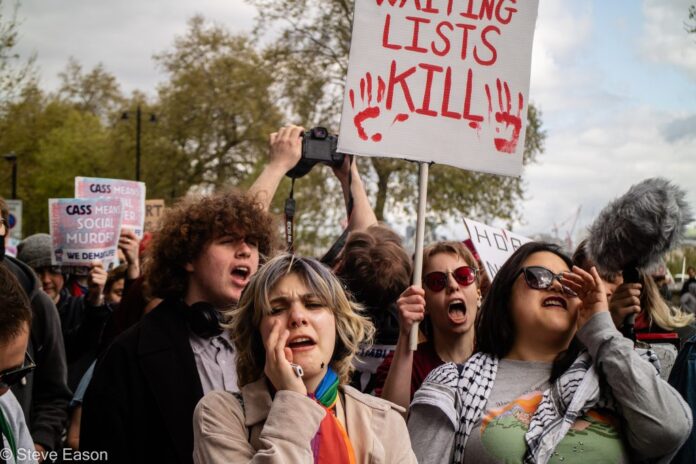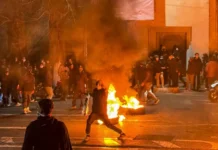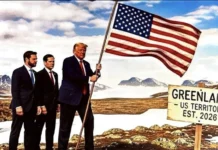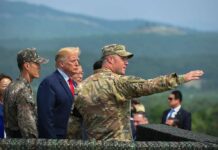This article was written by socialist and LGBTQ+ campaigners in Britain. In countries around the world, including Taiwan, big companies have hijacked Pride seasons, gay parades and other events for many years to “whitewash” their own image at these events. including printing rainbow flags on their merchandise and pretending to be defenders of LGBTQ+ rights during Pride campaigns This is about economics, to make profits, but also about politics: to co-opt the movement in a pro-establishment direction and away from more radical anti-capitalist struggle which is necessary to win true equality Many of these companies behind their “pinkwashing” mask are extremely reactionary and economically ruthless against grassroots working class people. . For example, BAE Systems provides weapon systems and various weapon parts to the Israeli Air Force. However, it sponsored seven Pride parades last year. Ironically, it was even selected by the British this year. Named one of the top 12 best online groups by the LGBT Awards.
Sara Guardiola, Socialist Alternative (ISA in England, Wales and Scotland)
Thousands of us who will be marching at Pride events this year know full well how dishonest this is. These corporations which profit from death and poverty need to be kicked out of our Pride marches. How can we do that? A big part of this will be organising alternative Pride events, with a clear anti-war, anti-capitalist stance. But we also need to challenge the corporations profiting from our oppression, by building a grassroots, organised working-class movement to reclaim Pride.
Israeli state pinkwashing
Central to this fight will be challenging ‘pinkwashing’. In the context of the Israeli state, appropriating ‘queer friendly’ imagery to cover for its brutal policies toward the Palestinians, this is especially crucial.
Israeli government propaganda routinely tries to portray the Israeli state as ‘progressive’, and as ‘the only pro-LGBTQ+ haven in the Middle East’. It even tries to use this to somehow justify the attacks on Palestinians, cynically presenting the genocidal attack in Gaza as a fight against Hamas’ reactionary anti-LGBTQ+ policies, as if it was intended to protect any democratic rights and LGBTQ+ rights in particular.
Let’s not forget the grotesque images circulated by the Israeli establishment media of a soldier waving the pride flag with the words “In the name of love” against a background of ruins of bombed houses in Gaza. The soldier even stated he was raising the first Pride flag in Gaza as a call for “peace and freedom”. Certainly not peace nor freedom for the more than 36,000 Palestinians – men, women, children, and many queer Palestinians among them, that have been murdered. What a mockery of a symbol of inclusion.
Contrary to the LGBTQ+ friendly image that the Israeli state tries to portray, marriage for LGBTQ+ couples isn’t legal in Israel. The government has cut 40% of the budget of the “Division for the Promotion of LGBT Populations”. Violent attacks against LGBTQ+ people within Israeli society have significantly escalated since the Netanyahu government and the extreme right came to power.
Betzalel Smotritz, the Israeli Finance Minister, and Itamar Ben Gvir, the Minister for National Security, were infamously amongst the organisers of the ‘cattle parade’ in Jerusalem 2006, comparing Pride marchers to animals. This counter march was organised a year following the stabbing of Jerusalem Pride marchers in 2005 and a growing incitement campaign and calls to ban Pride in Jerusalem.
While the attacker was caught and was in prison for years, as soon as he was released he announced he would stab Jerusalem Pride marchers again and announced so publicly – and so he did, murdering Shira Banki a 15 year old marcher. This sparked outrage not just towards the far right but the entire establishment and the police in particular. The Israeli capitalist and racist state is most brutal towards the Palestinian people, yet it is also oppressive against LGBTQ+ people, women, and other oppressed sections of the working class.
Our sister organisation in Israel-Palestine, Socialist Struggle, participated in the recent Pride demonstration in Jerusalem with slogans such as “No one is free until all of us are free – stop the bloodbath in Gaza” and “End to war, to LGBT-phobia, discrimination and poverty – overthrow the bloody government!”
They highlighted how the struggle to end systemic oppression of queer people must be grounded in a struggle against the genocidal war and all oppression bred by the capitalist system.
Solidarity in action
Many of those participating in the mass anti-war movement, including the student encampments in universities, are themselves young queer people, who are drawing connections between the oppressions they face and those of others around the world.
Many have marched under the banner ‘Queers for Palestine’ at solidarity demos and rallies. This points to the kind of global solidarity and linking up of struggles that is needed. This idea needs to be taken further through joint organising and action. The enemy we are up against is no less than the ruling class and its whole system – capitalism – which kills Palestinians, perpetrates imperialist wars, and upholds ideas which have led in recent years to increasing attacks against LGBTQ+ people.
In fact, the stigmatisation of marginalised groups is one of the key pillars of the capitalist system which relies on oppression, division and exploitation to exist and maintain its power. That is particularly the case in this period of extreme crises for the capitalist system, where so many parties and politicians around the world have turned to reaction and culture wars in an attempt to shore up support.
Anti-Vietnam War protests paved the way for Stonewall riot
The queer solidarity shown towards the Palestinian people is by no means new. Queer liberation movements have a long history of linking their struggle up with anti-war movements.
Many of the fighters who kickstarted the Stonewall Riot in 1969 were themselves also active in and inspired by the mass movement against the Vietnam War in the 60s and 70s, whose stance was the catalyst for the formation of groups like the Gay Liberation Front.
The mass demonstrations against the war in Vietnam provided a crucial opportunity for queer groups to emerge emboldened by a movement that over time became not just about the Vietnam War but also linked to other struggles including Black Freedom and women’s liberation. Famously, the growing Queer struggle at the time challenged existing prejudices throughout wider movements, for instance with a number of leading Black Panthers coming out in support of gay liberation in the early 1970s.The era of the Vietnam War shows us the enormous power of mass struggle. Popular resistance ended the Vietnam War. Although the movement against the attacks on Gaza is in a comparatively weaker position today, this is the kind of struggle we need to build towards – united along class lines.
War impacts queer people the hardest
We have seen governments across the world increasing their military spending, and when they spend billions on arms they tend to ‘find’ the money through austerity cuts. Queer people are then disproportionately impacted by unemployment and homelessness.
There is also an ideological impact. Wartime propaganda enforces rigid gender norms. Men need to be ‘tough and ready for war’ and women need to be carers. The title of an article in The Telegraph last August sums up this reactionary propaganda extremely well: ‘Young people are too fat and woke to fight’.
Alongside this militaristic push we have seen a right-wing backlash against feminism and queer movements, a whipping up of divisive ideas and culture wars. Our governments are fostering war and genocidal attacks abroad, while they erode our rights at home. They are closely bound up and have to be fought together, confronting the ideology of a ruling class which is pushing humanity into destruction.
We need to get organised
We need to build Pride campaigns that are democratically organised, which would allow everyone involved to discuss a concrete strategy and demands. This should include demands to redirect military spending to health and social services like refuges for survivors of abuse, good quality affordable housing, or massive emergency funding to end the privatisation of the NHS, to allow for comprehensive support, resources and free, widely accessible gender-affirming healthcare. Imagine what could be achieved with the £54.2 billion that the UK spent on defence in the 2023/24 financial year!
This could also become a space for discussion about how to link Pride’s demands with other struggles such as the anti-war movement, workers’ struggle and the climate movement.
Many of these demands pose political questions. Labour does not represent the interests of working class people and our rights are not any safer in their hands than the Tories’. This is why Socialist Alternative is calling for building democratic conferences of resistance, with regional and nationwide representatives, which could be a platform to coordinate the different struggles taking place.
These could also act as a launch pad to build a new left party of working-class struggle; one that is anti- war, that takes a clear stance against all forms of oppression and that fights for a fully-funded public healthcare, education, housing and jobs for all, and a society free of inequality and war.
Our source of strength lies in our ability to link up our fight with that of the wider working class. Our common daily experience of exploitation as working- class people gives us a common interest against the rule of the super-rich, but also the power to fight back as a united, multi-gendered, multi-racial force and end this brutal capitalist system. In the words of Marsha P. Johnson ‘No pride for some of us without liberation for all of us’.
In order to achieve revolutionary change and win lasting liberation we need to build a united fight against the capitalist system itself, overturn its exploitation and oppression and win a socialist society.




